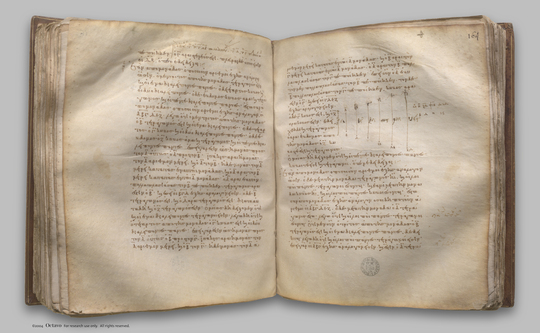index prev next | digilib folio 168

If as many numbers as we please beginning from an unit be in continued proportion, the third from the unit will be square, as will also those which successively leave out one; the fourth will be cube, as will also all those which leave out two; and the seventh will be at once cube and square, as will also those which leave out five.
| Ἐὰν ἀπὸ μονάδος ὁποσοιοῦν ἀριθμοὶ ἑξῆς ἀνάλογον ὦσιν, ὁ μὲν τρίτος ἀπὸ τῆς μονάδος τετράγωνος ἔσται καὶ οἱ ἕνα διαλείποντες, ὁ δὲ τέταρτος κύβος καὶ οἱ δύο διαλείποντες πάντες, ὁ δὲ ἕβδομος κύβος ἅμα καὶ τετράγωνος καὶ οἱ πέντε διαλείποντες. Ἔστωσαν ἀπὸ μονάδος ὁποσοιοῦν ἀριθμοὶ ἑξῆς ἀνάλογον οἱ Α, Β, Γ, Δ, Ε, Ζ: λέγω, ὅτι ὁ μὲν τρίτος ἀπὸ τῆς μονάδος ὁ Β τετράγωνός ἐστι καὶ οἱ ἕνα διαλείποντες πάντες, ὁ δὲ τέταρτος ὁ Γ κύβος καὶ οἱ δύο διαλείποντες πάντες, ὁ δὲ ἕβδομος ὁ Ζ κύβος ἅμα καὶ τετράγωνος καὶ οἱ πέντε διαλείποντες πάντες. Ἐπεὶ γάρ ἐστιν ὡς ἡ μονὰς πρὸς τὸν Α, οὕτως ὁ Α πρὸς τὸν Β, ἰσάκις ἄρα ἡ μονὰς τὸν Α ἀριθμὸν μετρεῖ καὶ ὁ Α τὸν Β. ἡ δὲ μονὰς τὸν Α ἀριθμὸν μετρεῖ κατὰ τὰς ἐν αὐτῷ μονάδας: καὶ ὁ Α ἄρα τὸν Β μετρεῖ κατὰ τὰς ἐν τῷ Α μονάδας. ὁ Α ἄρα ἑαυτὸν πολλαπλασιάσας τὸν Β πεποίηκεν: τετράγωνος ἄρα ἐστὶν ὁ Β. καὶ ἐπεὶ οἱ Β, Γ, Δ ἑξῆς ἀνάλογόν εἰσιν, ὁ δὲ Β τετράγωνός ἐστιν, καὶ ὁ Δ ἄρα τετράγωνός ἐστιν. διὰ τὰ αὐτὰ δὴ καὶ ὁ Ζ τετράγωνός ἐστιν. ὁμοίως δὴ δείξομεν, ὅτι καὶ οἱ ἕνα διαλείποντες πάντες τετράγωνοί εἰσιν. λέγω δή, ὅτι καὶ ὁ τέταρτος ἀπὸ τῆς μονάδος ὁ Γ κύβος ἐστὶ καὶ οἱ δύο διαλείποντες πάντες. ἐπεὶ γάρ ἐστιν ὡς ἡ μονὰς πρὸς τὸν Α, οὕτως ὁ Β πρὸς τὸν Γ, ἰσάκις ἄρα ἡ μονὰς τὸν Α ἀριθμὸν μετρεῖ καὶ ὁ Β τὸν Γ. ἡ δὲ μονὰς τὸν Α ἀριθμὸν μετρεῖ κατὰ τὰς ἐν τῷ Α μονάδας: καὶ ὁ Β ἄρα τὸν Γ μετρεῖ κατὰ τὰς ἐν τῷ Α μονάδας: ὁ Α ἄρα τὸν Β πολλαπλασιάσας τὸν Γ πεποίηκεν. ἐπεὶ οὖν ὁ Α ἑαυτὸν μὲν πολλαπλασιάσας τὸν Β πεποίηκεν, τὸν δὲ Β πολλαπλασιάσας τὸν Γ πεποίηκεν, κύβος ἄρα ἐστὶν ὁ Γ. καὶ ἐπεὶ οἱ Γ, Δ, Ε, Ζ ἑξῆς ἀνάλογόν εἰσιν, ὁ δὲ Γ κύβος ἐστίν, καὶ ὁ Ζ ἄρα κύβος ἐστίν. ἐδείχθη δὲ καὶ τετράγωνος: ὁ ἄρα ἕβδομος ἀπὸ τῆς μονάδος κύβος τέ ἐστι καὶ τετράγωνος. ὁμοίως δὴ δείξομεν, ὅτι καὶ οἱ πέντε διαλείποντες πάντες κύβοι τέ εἰσι καὶ τετράγωνοι: ὅπερ ἔδει δεῖξαι. | If as many numbers as we please beginning from an unit be in continued proportion, the third from the unit will be square, as will also those which successively leave out one; the fourth will be cube, as will also all those which leave out two; and the seventh will be at once cube and square, as will also those which leave out five. Let there be as many numbers as we please, A, B, C, D, E, F, beginning from an unit and in continued proportion; I say that B, the third from the unit, is square, as are also all those which leave out one; C, the fourth, is cube, as are also all those which leave out two; and F, the seventh, is at once cube and square, as are also all those which leave out five. For since, as the unit is to A, so is A to B, therefore the unit measures the number A the same number of times that A measures B. [VII. Def. 20] But the unit measures the number A according to the units in it; therefore A also measures B according to the units in A. Therefore A by multiplying itself has made B; therefore B is square. And, since B, C, D are in continued proportion, and B is square, therefore D is also square. [VIII. 22] For the same reason F is also square. Similarly we can prove that all those which leave out one are square. I say next that C, the fourth from the unit, is cube, as are also all those which leave out two. For since, as the unit is to A, so is B to C, therefore the unit measures the number A the same number of times that B measures C. But the unit measures the number A according to the units in A; therefore B also measures C according to the units in A. Therefore A by multiplying B has made C. Since then A by multiplying itself has made B, and by multiplying B has made C, therefore C is cube. And, since C, D, E, F are in continued proportion, and C is cube, therefore F is also cube. [VIII. 23] But it was also proved square; therefore the seventh from the unit is both cube and square. |